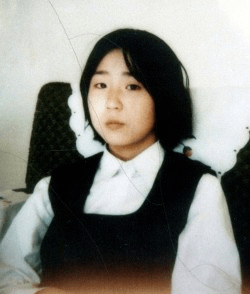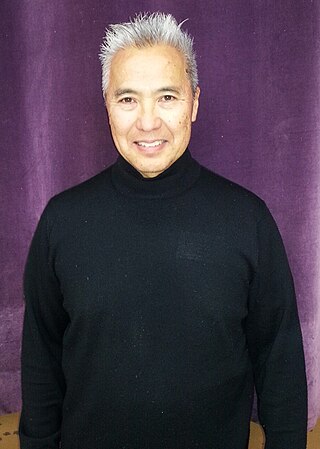Related Research Articles

Taiko are a broad range of Japanese percussion instruments. In Japanese, the term taiko refers to any kind of drum, but outside Japan, it is used specifically to refer to any of the various Japanese drums called wadaiko and to the form of ensemble taiko drumming more specifically called kumi-daiko. The process of constructing taiko varies between manufacturers, and the preparation of both the drum body and skin can take several years depending on the method.
Hiroshima is an American band formed in 1974 that incorporates Japanese instruments in its music. Hiroshima has sold over four million albums around the world.

Christopher Chiyan Tin is an American composer of art music, often composed for film, television, and video game soundtracks. His work is primarily orchestral and choral, often with a world music influence. He won two Grammy Awards for his classical crossover album Calling All Dawns.

Megumi Yokota is a Japanese citizen who was abducted by a North Korean agent in 1977 when she was a thirteen-year-old junior high school student. She was one of at least seventeen Japanese citizens kidnapped by North Korea in the late 1970s and early 1980s. The North Korean government has admitted to kidnapping Yokota, but has said that she died in captivity. Yokota's parents and others in Japan have publicly expressed the belief that she is still alive in North Korea and have waged a public campaign seeking her return to Japan.
"Baba Yetu" is the theme song for the 2005 video game Civilization IV. It was composed by Christopher Tin and performed by Ron Ragin and the Stanford Talisman. For its re-release in Tin's debut album Calling All Dawns, it was performed by the Soweto Gospel Choir. The song, when rereleased, became the first piece of video game music to be nominated for and to win a Grammy Award.

Battles Without Honor and Humanity: Deadly Fight in Hiroshima, also known as Hiroshima Death Match, is a 1973 Japanese yakuza film directed by Kinji Fukasaku. It is the second film in a five-part series that Fukasaku made in a span of just two years. It is the only movie in the series not to focus on Bunta Sugawara's character Shozo Hirono; instead it follows the rise and fall of Shoji Yamanaka, played by Kinya Kitaoji.
Lenny Seidman is a tabla player, a composer, a co-director of the Spoken Hand Percussion Orchestra, and a World Music/Jazz curator at the Painted Bride Art Center in Philadelphia.

Seiichi Tanaka is the first Japan-trained teacher of kumidaiko, or taiko, in the United States and is largely regarded as the father of the art form in North America.

Kenny Endo is an American musician and taiko master. He is the leader of several taiko ensembles and regularly tours, performing traditional and contemporary taiko music. Endo is also the first non-Japanese national to receive a natori in the field of hogaku hayashi, Japanese classical drumming. Today Endo composes his own music and plays taiko professionally as a solo artist, with his ensembles, and in collaboration with other artists.
Mark Miyoshi is a Japanese-American taiko maker. He is the owner and principal craftsman at Miyoshi Daiko, based in Mt. Shasta, California.
Kristofer Bergstrom is a leading American taiko player. He is a former member of Los Angeles-based taiko quartet, On Ensemble. In addition to taiko, Bergstrom plays the shamisen, koto, and turntable.
Johnny Mori is a third-generation (Sansei) Japanese American musician and arts educator/administrator from Los Angeles. He was one of the seminal members of the taiko group Kinnara Taiko and the original taiko drummer for the Grammy nominated jazz-fusion band Hiroshima.
Kelvin Underwood is an American musician specializing in the drum set and taiko, the art of Japanese drumming. After joining the Japanese taiko ensemble Ondekoza at age 19, he returned to the United States four years later to pursue a career as a professional drummer. He is a member of the Los Angeles–based contemporary taiko quartet On Ensemble and collaborates with a variety of other artists and performers. Underwood resides in Ashland, Oregon with his two children.
Stanford Taiko is a collegiate taiko group based at Stanford University. One of the first collegiate taiko groups to form in North America, it was founded in the winter of 1992 by students Ann Ishimaru and Valerie Mih as a way to share taiko with the university community. As the founding organization of the Intercollegiate Taiko Invitational, Stanford Taiko has been instrumental in the development of collegiate taiko throughout the United States, as well as the larger North American taiko community through performing at the Taiko Jam of the North American Taiko Conference. Since 2000, the group has been active in the international scene through tours and exchange concerts in countries such as Japan, China, and Thailand.
Denver Taiko is the fourth taiko group founded in North America and the first taiko ensemble outside of California, United States. The group has a close partnership with the Tri-State Denver Buddhist Temple and performs throughout Colorado and neighboring states. In 2001, Denver Taiko received the Excellence in the Arts Award from Denver Mayor Wellington Webb. Today, Denver Taiko is an ensemble of third, fourth, and fifth generation Japanese Americans with a shared interest in honoring their Japanese American cultural heritage.

Portland Taiko is a kumidaiko performance group based in Portland, Oregon, United States. Kumidaiko is the Japanese art form of ensemble drumming, also well known as "taiko", the Japanese word for drum. Portland Taiko was created in early 1994 by Ann Ishimaru and Zack Semke, both charter members of Stanford Taiko, Kyle Kajihiro, Valerie Otani, Kenji Spielman, and June Arima Schumann. Portland Taiko is an active organization to the present day and maintains professionalism in national performance tours, workshops, educational and community outreach and innovation in taiko playing. Portland Taiko is one of the only large taiko groups in the Pacific Northwest, with their closest counterpart being Seattle Kokon Taiko in Seattle, Washington.
Seattle Kokon Taiko is a North American taiko ensemble based in Seattle, Washington.
San Francisco Taiko Dojo, founded in 1968 by Grand Master Seiichi Tanaka, was the first taiko group in North America, and has been seen as the primary link between the Japanese and North American branches of the art form. Additionally, Tanaka's belief that learning to play taiko only requires a genuine interest in the art form, has greatly contributed to taiko's success and growth outside Japan.
Kinnara Taiko is a Japanese American drumming ensemble based out of Senshin Buddhist Temple in Los Angeles, US. They began playing taiko in 1969 when a few third-generation Japanese Americans gathered after an Obon festival and had an impromptu experimental session on an odaiko drum.
Isaku Kageyama is an American musician, composer, producer, and educator, specialized in taiko drums. He is a member of Tokyo-based taiko ensemble called Amanojaku and he currently attends Berklee College of Music. He is famous for his fusion of traditional Japanese music with jazz, rock and club music, whereby he has collaborated with many jazz artists such as Eric Gravatt, Terumasa Hino, Toshinori Kondo, and Kazutoki Umezu, as well as a wide range of ethnic musicians.
References
- ↑ "On Ensemble: Contemporary taiko quartet". On Ensemble. 2010. Retrieved May 5, 2010.
- ↑ "Shoji Kameda". Hiroshima. 2010. Retrieved May 5, 2010.
- 1 2 3 Alex Isao Herbach (2007). "Taiko in Transition". Archived from the original on November 11, 2007. Retrieved May 8, 2010.
- ↑ "Shasta Taiko".
- ↑ "Alumni". Stanford Taiko. 2010. Retrieved May 5, 2010.
- ↑ Brian Moore (2005). "On Ensemble:Dust and Sand". Archived from the original on July 17, 2011.
- ↑ "LMNOP Reviews". 2009.
- ↑ Skye Kinkade (2009). "Mount Shasta's Shoji Kameda nominated for a Grammy". Archived from the original on February 11, 2010. Retrieved May 8, 2010.
- ↑ "Stevie Wonder Performs at the Democratic National Convention". YouTube . 2008. Archived from the original on December 15, 2021.
- ↑ "The Khoomei-Taiko Ensemble". 2009. Archived from the original on June 13, 2011.
- ↑ "Khoomei Taiko". 2009. Archived from the original on July 12, 2011.
- ↑ Jason Dorough (2009). "Review: Heroes Original Television Score" . Retrieved May 8, 2010.
- ↑ Matt Zoller Seitz (January 11, 2007). "A Portrait of Lives Transformed by Trauma". New York Times.
- ↑ "Last Call for the Florida Film Festival". 2010. Archived from the original on August 12, 2011.
- ↑ "APPEX 2006 Artist Bios". 2006.
- ↑ Lewis Segal (August 15, 2006). "CRITIC'S NOTEBOOK; Worlds meet – in theory, anyway; At APPEX, collaboration is celebrated, but not always successfully". Archived from the original on July 12, 2012.
- ↑ "Indonesian Arts Education – American Fellows". 2009.